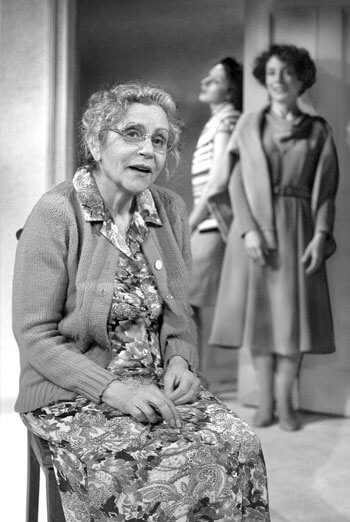A new play by James Sherman explores the meaning of family
James Sherman’s new play “From Door to Door” is a warmly lyrical family drama played out through the experiences and interactions of three generations of Jewish women. It’s also an exploration of how culture and religion shape an individual’s experiences, at times creating neuroses.
The writing is so gently heartfelt and the three performances so beautifully rendered that this play is like a walk down a familiar path bathed in a different light. For all its familiarity, “From Door to Door” is nonetheless a novel take on the interplay of recognition and disconnection.
The play begins in 1939 but the experiences of the women reach back further, such as Bessie, the oldest character, who remembers escaping the pogroms of the late 19th century in Russia and coming to New York where she raised her daughter Mary. Mary in turned raised a daughter, Deborah, and the action of the play takes place in different times with each woman appearing both as mother and daughter at different times.
Along the way, we learn that each harbors secrets and that each has sacrificed, and we see the elemental power of family bonds dictating life choices. If Sherman’s play is somewhat romanticized and if the plot is somewhat manipulated to drive specific scenes, these quibbles are easily forgiven because the relationships among the women are so feelingly developed.
Sherman captures the different rhythms and forms of expression of each of the three generations he portrays. The use of Yiddish in everyday speech is one of the metaphors in his script, and Bessie liberally sprinkles her English with Yiddish, Mary does less so though she understands the language, and Deborah works hard just to understand it. Simplistic, perhaps, but the communication feels consistently real and underscores how families speak to one another over the generations, giving the play a wonderful sense of intimacy. Sherman is also an economical writer whose repeating images of making cabbage soup, attending weddings, and unpacking the car create the bittersweet sense of the world as it changes and evolves.
Joe Brancato has a sensitive hand in directing the play, finding the rhythms of the individual characters as well as exploring their interpersonal dynamics. Much of the focus is on Mary who is in the middle and symbolic of the transitional generation that was no longer bound by, and resigned to, tradition, but which had not yet found feminist liberation.
The three women in the cast are each terrific. Anita Keal as Bessie has an edge and a sparkle that shows that while she may be living out a role, she is her own woman. Suzanne Toren as Mary delivers an understated but fully developed character through which we see the cultural and familial tensions that pull on her. Sara McCafrey as Deborah is consistently delightful as the youngest woman in the cast. While the other women have been destined since birth for their roles as caretakers and nurturers, Deborah must discover hers, and as she embraces it there is a sense of connection and humanity that gives her a depth she had not had before.
It is certainly a romantic notion to think that the events of life will allow us to be fully realized people—not without stresses or disappointments but fully accepting of ourselves—and “From Door to Door” offers us the hope to embrace that fullest potential.


































